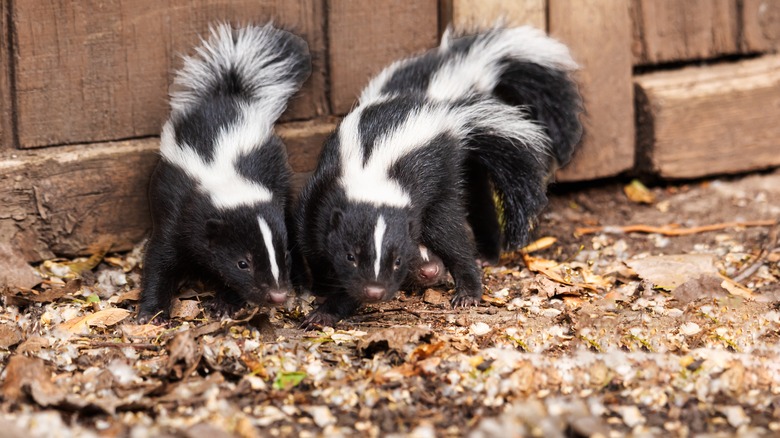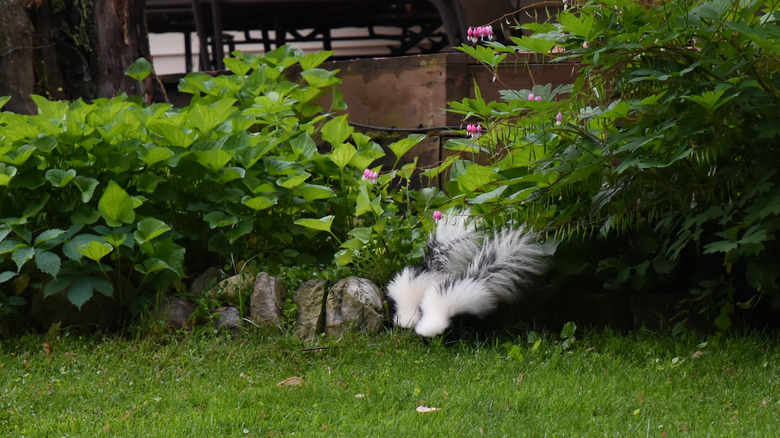Does Tomato Juice Actually Work To Get Rid Of The Smell Of Skunk Spray?
Part of being a child meant growing up with a host of irrational fears brought on by cautionary tales from adults and too many whimsical cartoons. Put a finger down if you were scared of inevitably being buried alive in a pile of quicksand or getting lost somewhere in the Bermuda Triangle — we're all guilty. One other common fear we collectively shared was getting sprayed from head to toe by an angry skunk before we had time to run away. However, the antidote to this, as we were countlessly reassured, was to drench ourselves in a tomato juice bath. Fortunately, many of us never experienced being blasted with smelly skunk spray, because we would've been severely disappointed when the tomato juice didn't work.
Skunks are notorious for the rancid-smelling liquid they release in sprays from their anal glands when they feel threatened. This liquid is rich in sulfur compounds, particularly thiol and thioacetates, and it is meant to send predators and attackers running in the opposite direction. Tomato juice being able to wipe out the stench by dissolving it is only a myth, so if you ever come in contact with a frightened skunk, don't go grabbing a jar of marinara.
Tomato juice cannot break down the chemicals in skunk spray
The reason people think tomatoes are effective against skunk spray may be due to the fruit's acid content. Tomatoes may be rich in acids, but they can't clean away the smell of skunk spray — they only mask it. According to Healthline, the potency of tomato juice stops at covering the stench and doesn't actually neutralize the chemicals that cause it. The skunk's secretion is oily, as well as gross, which makes it even more difficult to wash off with just tomato juice or sauce.
If you happen upon an unsuspecting skunk and end up getting shot with a blast of their foul-smelling liquid, then you will need a solution that will break down the thiols and thioacetates rather than sit on them. The Humane Society of the United States recommends using a mixture of hydrogen peroxide, baking soda, and liquid soap to denature those smelly sulfur compounds. Mix together 1 quart of hydrogen peroxide, ¼ cup of baking soda, and 1 teaspoon of soap. Make sure to use protective gloves and avoid your eyes while you bathe yourself thoroughly in this mixture. Whatever you do, don't store the concoction, even if you live in a skunk-prevalent area. The Society warns against this because it can cause its container to explode.
Prevent a skunk encounter by repelling them from your home
If you do live in a zone where skunk patrols are the order of the day, there are steps you can take to prevent the unwanted skunks from entering your yard and avoid getting sprayed. Skunks are nocturnal animals, so if you have any hopes of catching them in your yard, it'll probably be in the nighttime. Like all creatures, they will only care to inhabit areas that are favorable to them. If you have fruit trees, the Humane Society advises that you avoid letting the fruit get close enough to the ground for the skunks to reach. Also, keep your exterior garbage can clean and free of enticing food that would attract the cute critters.
If you do all of this and still see a skunk roaming around your space, it may be time to deter it. Skunks have a great sense of smell that you can use to your advantage. You can mix together 1 pint of liquid soap and castor oil into 1 gallon of water and spray this around your yard. If you have a bit of cash to throw around, you can also invest in a motion-detecting sprinkler. Once the skunk wanders into your garden, the resulting shower will send it scampering off.


